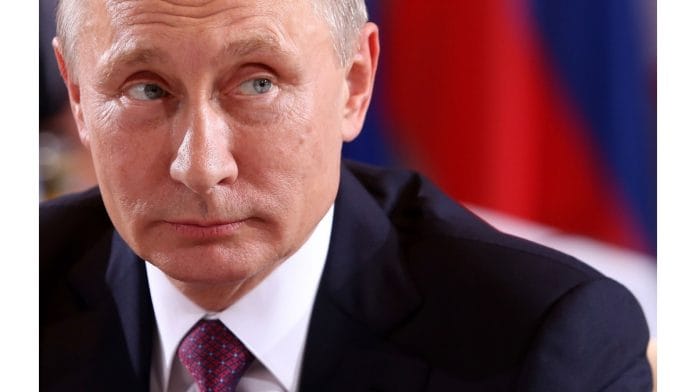So it has begun. Russian President Vladimir Putin, by recognizing two separatist regions of Ukraine as independent states and sending in Russian soldiers as “peacekeepers,” has made the overture for what could become war. What’s on the man’s mind? How does he see the world? Analysts and pundits everywhere have been wondering. The possibilities are frightening.
There was a time, in the early years of his reign, when Putin still surrounded himself with advisers and experts who gave him diverse views and interpretations of the world, a time when he spoke to foreign leaders and actually listened to them. By all appearances, he was in touch with reality.
But at some point — more than a decade ago — Putin began constructing an alternate reality. He became a hobby historian and made up his own theories about the past, eliding facts willy-nilly to tell himself stories he liked. In one of these, Ukraine is not a proper country, just a part of a greater Russia — his Russia. In 2014, he began seizing parts of it.
Around that time, Angela Merkel, then German chancellor, had many conversations with him. She’s a fluent Russian speaker and is said to be the world leader who understands Putin best. After one call, she turned to her aides and said she was “not sure he was in touch with reality,” that he seemed to live “in another world.”
Eight years on and Putin has, by all appearances, journeyed further into his own metaverse. As the political scientists Adam Casey and Seva Gunitsky describe in Foreign Affairs, that’s because the Russian president, like most strongmen, has created an information bubble from which he can no longer escape.
Also read: Why Donetsk & Luhansk, Ukraine’s rebel territories recognised by Russia, matter
Obsessed with secrecy, he doesn’t even use a cell phone. He’s shrunk his circle of advisers to just a few minions, chosen for loyalty or sycophancy rather than competence. They come disproportionately from the so-called siloviki, the top brass of the army and services like the FSB, the successor to the KGB that was Putin’s own alma mater.
These yes-men (most are men) mirror back to Putin his paranoia about an allegedly aggressive “West.” They feed his hawkish ego and withhold information about risks, making him feel more in control of events than he is. In effect, Putin has built a machine for confirmation bias. The pandemic has made all this worse. It’s turned Putin into a germaphobe, who lets hardly anybody near him, and then only at shouting distance.
Putin is far from unique in succumbing to this interplay of seclusion and delusion. Power corrupts, absolute power corrupts absolutely, the British historian Lord Acton famously observed. He could have added that power also isolates, and distorts reality as a result. It has happened to every tyrant from Nero to Saddam Hussein, and uncountable corporate honchos and other kingpins, poo-bahs and bigwigs.
Nor is the affliction necessarily a peculiarity of autocracies. Former U.S. President Donald Trump has at times behaved as though he were emulating Putin in style, and approaches truth and facts with similar legerdemain. The difference is that a Trump, living in a vibrant democracy like the U.S., can only banish countervailing views from his own circle. A Putin, in charge of an authoritarian propaganda and security apparatus, can suppress them in nearly all of public life.
And so we get scenes like this week’s, which look satirical until you realize they’re historic. First Putin, behind a gilded desk, convenes his so-called Security Council in a rotunda fringed by faux-Corinthian columns. He seats the cronies on simple chairs at a great distance, leaving them to writhe awkwardly and anxiously. Some stammer incoherently. Putin orders them to be clear, then prompts them to utter the correct words. When one accidentally supports annexing Donetsk and Luhansk, Putin reminds him that he’s just deciding on their independence for now. A Suetonius, Shakespeare or Orwell could not write a more devastating script.
Next, Putin takes to the airwaves with another rambling amateur history lecture that leaves the outside world rolling its eyes. Ukraine was an invention of Lenin, and is now a pawn of the West? There’s a genocide of Russians in the country’s east? Seriously.
Putin watchers often speculate whether the man actually believes this humbug or is just being cynical. At some point, that distinction no longer matters, because when people hear themselves or others repeating something often enough, they deem it true. Either way, there’s nobody around him who can or will set Putin straight.
Some Western pundits seem to regard Putin as an evil genius, a tactical mastermind who’ll outsmart us all. Maybe. But it seems more plausible that Putin is just an ordinary human being who’s been alone in his echo chamber too long to hear any sounds from the outside — a man who’s been wearing the goggles of power until he can no longer see anything but his virtual reality. This makes Putin more dangerous, not less. – Bloomberg
Also read: Ukraine crisis is a litmus test for all — US, EU, UN, and also for India






